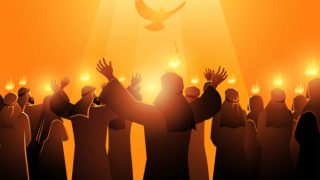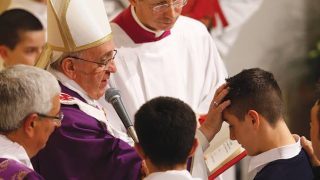
CHRIST OUR GUARD AND SECURITY
HOMILY FOR FOURTH SUNDAY OF EASTER (GOOD SHEPHERD SUNDAY), YEAR C. Readings: Acts 13:14.43-52; Psalm 100; Revelation 7:9.14-17; John 10:27-30.
Traditionally, on the fourth Sunday of Easter the Church celebrates Good Shepherd Sunday. The gospel reading is usually from John chapter ten which has the parable of the good shepherd read in the three years of the liturgical cycle. Simultaneously the Church celebrates Vocation Sunday, a day of special prayers for those who are “shepherds” in the Church. Practically, when we reflect on the Good Shepherd, we also reflect on the flock and our vocation. Who then is the Good Shepherd and who are the flocks? If some are termed good, then, who are the bad shepherds and flock? What are the qualities expected of the Good Shepherd and flocks? They ought to hear/listen and follow the Master.
The liturgy of last Sunday gave an introduction to today’s liturgy when Christ asked Peter to continue with the work of good shepherds when He said, “Feed my sheep and tend my lambs” (John 21:15-17). It entails the evangelical and pastoral role of Peter as ‘tend’ implies a broader kind of care for the sheep’s health and safety: a responsibility given to Peter as shepherd. Culturally in Israel, being a shepherd is not just a profession, it is a vocation; it is a call to service and sacrifice. It is a deep bond of love, care, protection between the shepherd and his sheep. The shepherd is like a real father to his flock. He takes care of them, guides them and leads them. He is like a doctor or nurse when new flocks are born; he is the nurse when they are sick; when they are weak, he carries them on his shoulder and moves on. Invariably, a good relationship must exist between the shepherd and the sheep, just like the love and unity that exist between the Father and the Son, of whom the quality of a Shepherd is personified in Christ.
Ezekiel chapter 34 speaks more of the shepherds and the sheep. Regarding the civil and spiritual leaders, God rebuked and warned those shepherds who were concerned about feeding themselves and not their flock. Shepherds who were motivated by self-interest, capitalizing on their position to extort from their flocks without caring for them in return. No interest to strengthen the weak, nor heal the sick, nor bind up the broken, nor seek what was lost. These shepherds ruled the flocks with force and cruelty (vv. 3-4). Seeing this, God promises to do the work the unfaithful shepherds would not do. He said, “I will search for my sheep and seek them out. I will seek what was lost and bring back what was driven away, bind up the broken and strengthen what was sick; but I will destroy the fat and the strong and feed them in judgment” (11-16).
In the Gospel, Christ is the fulfilment of God’s promises as the Good Shepherd who laid down his life for his sheep that they may have life. He said, “My sheep hear my voice, and I know them, and they follow me; and I give them eternal life, and they shall never perish, and no one shall snatch them out of my hand” (vv. 27-28). The security that Christ, the Good Shepherd offers to his sheep is not security, as the world understands security. His sheep will not perish and no one will snatch them out of His hand, but many will die for their faith, lose their jobs, be denied opportunities, suffer ridicules because of their faith. What they will not lose is their relationship with the Father and the Son or the salvation that relationship brings. The Good Shepherd gives security of eternal life to the sheep that hears/listens to His voice and follow him.
In today’s first reading, we see two of the sheep that have become shepherds: Paul and Barnabas, doing the work of the Great Shepherd. They instructed, preached, and made the name of Jesus known among the Jews and Gentiles. When the sheep of Israel (the Jews) refused to hear their voices and instead persecuted them, they turned to the sheep of the Gentiles/non-Jews/Pagans saying, “It was necessary that the word of God should be spoken first to you. Since you thrust it from you and judge yourself unworthy of eternal life, behold, we turn to the Gentiles” (v.46). The Gentiles responded to Paul’s invitation and Paul showed wisdom in not spending his time trying to persuade hardened hearts. However, he still prayed for the conversion of Israel (Rm. 10:1). By this act, Paul upheld his vocation as missionary to the Gentiles, “I have set you to be a light to the Gentiles, that you may bring my salvation to the uttermost parts of the earth” (v. 47).
Dear friends in Christ, as we celebrate Good Shepherd Sunday, we are reminded that we are both shepherds and flocks of the Church. In the strict sense, the bishops are our shepherds with their Cruosier and mitre, the symbol of a shepherd and authorities, to guide, teach and lead the people of God by good examples of the qualities of Christ the Good Shepherd. The same is applicable to all clergies to whom the flock of Christ has been entrusted. That is why today is traditionally known as the “World Day of Prayer for Priestly Vocation and Religious Life.” Let us not be among the flocks that only sends destructive criticisms to clerics, but rather help them with our prayers. In fact, by the virtue of our baptism, we all are shepherds in various level: family or societal levels. May Christ our Good Shepherd guide us along the right path. Amen!
Happy Good Shepherd Sunday!
Fr. Ken Dogbo, OSJ










